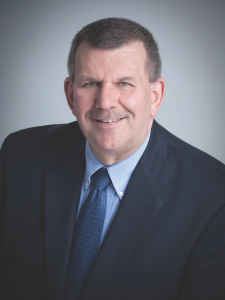ABOUT: KATE CARR
 Kate Carr joined the Hearing Industries Association (HIA) as President in May 2018. She brings extensive expertise in non-profit management, government, cause marketing and advocacy to HIA and has devoted her career to organizations that change outcomes in health care and improve the lives of children and families.
Kate Carr joined the Hearing Industries Association (HIA) as President in May 2018. She brings extensive expertise in non-profit management, government, cause marketing and advocacy to HIA and has devoted her career to organizations that change outcomes in health care and improve the lives of children and families.
ABOUT: THOMAS POWERS
 Thomas Powers, Ph.D., is the Managing Member of Powers Consulting, LLC, providing management consulting to the hearing health industry.
Thomas Powers, Ph.D., is the Managing Member of Powers Consulting, LLC, providing management consulting to the hearing health industry.
Dr. Powers is an audiologist and industry consultant and serves as a strategic advisor for the Hearing Industries Association. Dr. Powers will discuss the medical implications and comorbidities associated with hearing loss.
This new FDA rule means for hearing health and what listeners need to know about hearing loss and treatment. HIA supports greater access to hearing aids and suggests that before making a purchase, having a hearing test by a professional is a smart move. Earlier this summer, HIA, in partnership with multiple industry leaders, professional and consumer organizations, announced the Hear Well campaign (hearing.org), which aims to educate the public about the importance of hearing health and the value of seeing a hearing professional.
What we know:
Around 1 in 3 people between the ages of 65 and 74 have hearing loss, and nearly half of those older than 75 have difficulty hearing.[ii]
Mild hearing loss doubles dementia risk, moderate hearing loss triples the risk, and people with a severe hearing impairment are 5x more likely to develop dementia.[iii]
In a survey of over 3,000 individuals with hearing difficulty, 38% of respondents with hearing difficulty reported having a hearing aid.
8 in 10 people who chose to treat their hearing loss report life-changing results and 91 percent of hearing aid owners say they are satisfied with their hearing professional.[iv]
One-third of the total cost of hearing aids accounts for the manufacturing of the technology and the style of device chosen (basic, standard, advanced, or premium) while the remaining cost consists of services provided by the hearing professional and the cost of maintaining a business.
Over-the-counter (OTC) hearing aids will be sold to adults with perceived mild-to-moderate hearing loss without the service of the hearing professional which impacts the overall price of the device(s) and allows consumers to find treatment at a wider range of price points.
Blackwell DL, Lucas JW, Clarke TC. Summary health statistics for U.S. adults: National Health Interview Survey, 2012 (PDF). National Center for Health Statistics. Vital Health Stat 10(260). 2014
[ii] Age-Related Hearing Loss (Presbycusis) — Causes and Treatment. (2022). Retrieved from https://www.nidcd.nih.gov/health/age-related-hearing-loss#:~:text=Approximately%20one%20in%20three%20people,%2C%20doorbells%2C%20and%20smoke%20alarms
[iii] “The Hidden Risks of Hearing Loss.” Johns Hopkins Medicine. https://www.hopkinsmedicine.org/health/healthy_aging/healthy_body/the-hidden-risks-of-hearing-loss Accessed August 16, 2018
[iv] Powers TA, Carr K. MarkeTrak 2022: Navigating the changing landscape of hearing healthcare. Hearing Review. 2022;29(5):12-17.
For more information please visit: hearing.org



